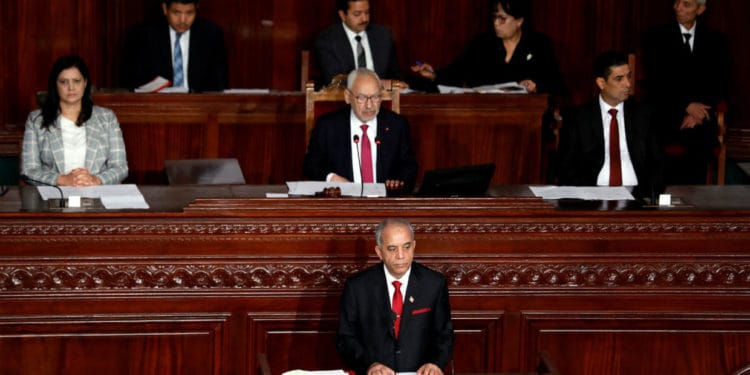Eleven members of Qalb Tounes (Heart of Tunisia), the party with the second-most seats in parliament (38), staged a spectacular mutiny when they resigned on Tuesday, but one has already returned to the fold.
Tunisian MP Hassen Belhaj Brahim, who resigned from the Qalb Tounes just days ago, has now asked the president of the HPR office for his resignation to be rescinded.
On Thursday, a Qalb Tounes press release confirmed Brahim had been reintegrated into the party and that the cancellation of his resignation was accepted.
The ten members to slam the door on their party, included high ranking members like Hatem Mliki. Mliki and Ridha Charfreddine, Khaled Gsouma, Naïma Mansouri, Amira Charfeddine, Safé Ghribi, Souhir Askri, Mariem Moghmani, Samira Ben Slama, and Imec Awled Jebrilwill now sit on the crossbenches of Tunisia’s disparate parliament and it is still unclear how they will vote.
The party subsequently announced that Oussama Khelifi will be the new parliamentary leader of the party, and economic expert Sadok Jabnoun the new party spokesman.
Tunisia went through four months of political negotiations and instability after the October 2019 elections failed to deliver a clear result and mandate for a new government. No party gained more than a quarter of the vote, leaving the parliament deeply fragmented.
On February 27 the 32-person cabinet of Prime Minister-designate Elyes Fakhfakh was given the green light to form a government following a confidence vote in parliament.
The coalition government included members of Ennahdha, the party with the most seats in parliament, plus 17 independent members, but notably excluded members of Qalb Tounes.
Left out of government, Qalb Tunes have so far positioned themselves firmly in opposition to Fakhfakh’s government. From the outset, they voted against the Prime Minister-designate’s proposed cabinet. Then on March 5, they voted down a motion on the African Continental Free Trade Area, which promised to open up valuable opportunities for the Tunisian economy in the broader African market.
“We don’t want to be in a destructive opposition,” now ex-Qalb Tounes party spokesperson Hatem Mliki emphasized when detailing reasons for his colleagues’ resignations.
Commentators believe that the disintegration of Qalb Tounes is an example of the trend towards ‘single-use’ or ‘disposable’ political parties in the nascent democracy. A phenomenon where parties tend to form around an individual or issue but have little else in common, making them highly volatile.
Marouen Achouri, said it’s no wonder that Qalb Tounes is experiencing such serious internal divisions, given the party was formed around Nabil Karoui with the sole purpose of elevating him to the presidency.
Achouri argues it lacks the basic requirements of any political party‒shared political ideas and values ‒ and therefore was always destined to fail.
One of the MPs to resign, Mliki cited the absence of internal party governance and lack of collaboration on decision-making regarding their engagement with the government and President, as key reasons for the mass exodus.
When Fakhfakh formed government in late February, many questioned if he would succeed in maintaining unity and finding consensus amongst such a disparate group of deputies. What remains to be seen now is how the split in Qalb Tounes will materialize when it comes to voting on legislation addressing the key socio-economic challenges facing Tunisia, and if more resignations are to come.
Read also: Tunisia Forms New Government Promising Stability and ‘Deep’ Reform

